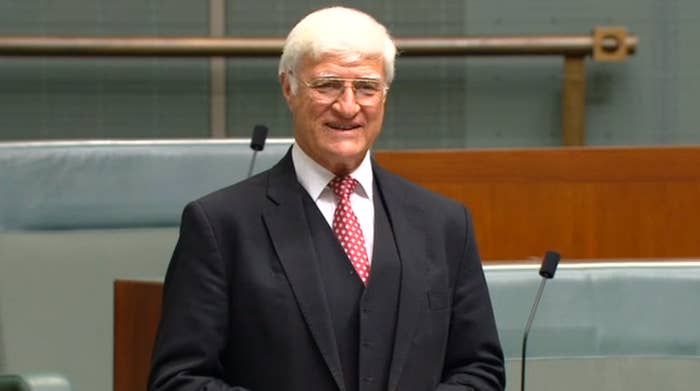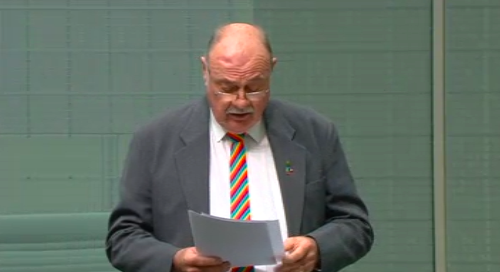
Bob Katter, who infamously said he wouldn't be spending any time on marriage equality because every three months someone in North Queensland was torn to pieces by a crocodile, was the final MP to give a speech on marriage equality in parliament on Wednesday night.
After124 MPs had spoken on the legislation, Katter rose shortly after 10pm for his turn. He had sat in the chamber for about half an hour before speaking, heckling Labor and Coalition MPs.
"I have heard a conglomeration of snivelling drivel in my life, but there is not the slightest scintilla of intellectual content in any one of tonight's speeches," he said in his speech.
Katter – a longtime opponent of same-sex marriage – started by saying he was not at all mad about the debate. In fact, he thought it was funny. He thinks no one wants to get married.
"I've never been angry throughout this debate. I've found it extremely humorous, I've got to say. I said, 'Listen, mate, I don't know what it's like down south, but 5% of the population of Australia lives up here in North Queensland, and I don't think it's a great deal different to the rest of Australia, and no one seems to get married up here. I can't remember the last time I found a couple getting married. So, mate, we can't get the heteros to marry –you've got absolutely no hope of getting that other mob to marry. But thanks for your call.' I thought it was funny."
Then he said his own party had started out as an "anti-homosexual party" because of an ad launching the party that attempted to scaremonger about marriage equality, but said he was sorry for that.
He then claimed that LGBTI people are going against their "genetic programming": "The people advocating this proposition tonight, the LGBTIs, have maybe 60 years on their side. I have 3.5 million years of genetic programming on my side, because we human beings, they tell us, have been around for 3.5 million years."
Then he tried to claim that homosexuality is more prevalent in Australia than elsewhere, and that this has something to do with male juvenile suicide rates.
"If you analyse why this country continuously has the highest male juvenile suicide rates in the world – why is that? There is something going wrong here. We have an extraordinary incidence of homosexual behaviour in Australia compared with other nations, and I think the people who have been speaking for this bill would agree with me on that."
Data from the Australian Bureau of Statistics shows Australia does frequently rank as the country with one of the higher rates of youth male suicide in the world, but there is no data to suggest that "homosexual behaviour" is higher in Australia than any other comparable nation.
Then Katter said people would be silenced. He said the "bishop of Tasmania was criminally prosecuted for saying 'It's wrong to do that'."
It was the archbishop of Hobart (not Tasmania), Julian Porteous, who was taken to a civil (not criminal) anti-discrimination tribunal over a pamphlet distributed in Catholic schools that said same-sex marriage would be "messing with kids". The case was ultimately dropped.
"They try and throw the bishop of Tasmania in jail; they scream abuse at us; they campaign against us," he said. "But that's alright. They can do that."
He then said that when he spoke at a Coalition for Marriage event in Queensland, he heard from two young mothers.
"The first one started off by saying: 'My son told me that he had to go to school tomorrow in a dress,' and I said, 'My boys will never, ever go in public in a dress.' I rang up the headmaster of the school, and he more or less told me, 'It's the orders of the education department, and you'll send your kid to school in a dress.'"
Katter is possibly referring here to a mother from a Coalition for Marriage ad that referred to a school telling her son that he could wear a dress if he wanted. It wasn't compulsory, and the school in question denied this was said.
Then Katter went further, suggesting gay people had demanded the right to give blood, and this led to children being injected "with AIDS".
"You talk about equality. They wanted equality in the giving of blood. They said, 'We as homosexuals have a right to give blood', so they did, and I think 72 children were injected with AIDS from the blood that was given. It was hushed up. It was amazing to me that it never got any publicity at all. I actually had to ring up to verify whether the newspaper report I'd read was correct. There were 724 AIDS cases in this country, and no-one ever brought up the fact all of those AIDS cases, apart from the poor little children who got it through blood transfusion – whatever figure it was –were either intravenous drug users or men participating in homosexual behaviour. There were only two out of 724 cases that claim they weren't, and the report noted that they were living with an at-risk person – in other words, a homosexual person. So there was no such thing as AIDS in this country except within that narrow group of intravenous drug users and people participating in that sort of behaviour."
It is unclear where Katter got the figures for this one. There have been tens of thousands of Australians living with HIV/AIDS. Australia had one of the earliest and strictest regimes for screening blood for HIV going back to 1985. There were 724 cases of HIV transmission in 1999, but the documentation from the time makes clear that heterosexual sex has also led to HIV transmission, as well as mothers passing on HIV to their children.
Today men who have sex with men still can't donate blood for a period of 12 months after they last had sex with another man.
Then he just made even less sense, if possible. Just...no sense at all.
"I watched on television last night a murder case involving two people of that persuasion. When I came to the office today my chief of staff, who, I might add, voted 'yes', said, 'You'd better write so-and-so a card or something'. I said, 'What's that all about?' — 'Oh,' she said, 'the son got murdered. He was in a homosexual relationship.' We all know about the Versace case. This was another case. There's no doubt there is a DNA thing there, and some people can handle it but a lot of people can't. And there is a very, very ugly side to this, where the curtain comes down and we're not allowed to talk about it.
"Mr Deputy Speaker, there is an ultimate statement upon a race of people, and that is that they simply vanish from the gene pool. If you take out my cousin-brothers, the First Australians, and if you take out the migrant population in Australia — recent migrants — then we have the lowest birth rate on earth. We are a vanishing race. Bob Birrell, the demographer from Melbourne, wrote an article in which he said that the current population of Australia is 22 million and within 100 years the population of Australia will be 7,000. I thought, 'This is ridiculous!' I went down to check it in the library. He said that when 20 Australians die they're replaced by only 17 people, and if that happened five times over a century then we would go from 21 million or 22 million people — whatever it was at the time — down to 7 million people."
The chamber was mostly empty, save for one Labor MP, Nick Champion, and the leader of the house, Christopher Pyne, who on a number of occasions said to Katter he was talking "rubbish".
When summing up the second reading speeches, Liberal MP and longtime equality advocate Warren Entsch slammed Katter for what he said was a cringeworthy effort.

"His pathetic attempts of humour, insensitivity, grossly misleading comments were devoid of any facts and were highly offensive, embarrassing, and cringeworthy," Entsch said. "They need to be called out for what they are. His speech exemplifies what the LGBTI community have had to endure for so long."
Entsch said Katter's speech did not represent the overwhelming view of the parliament.
If you need to talk to someone, you can call Lifeline Australia on 13 11 14 or Beyond Blue Australia on 1300 22 4636.
